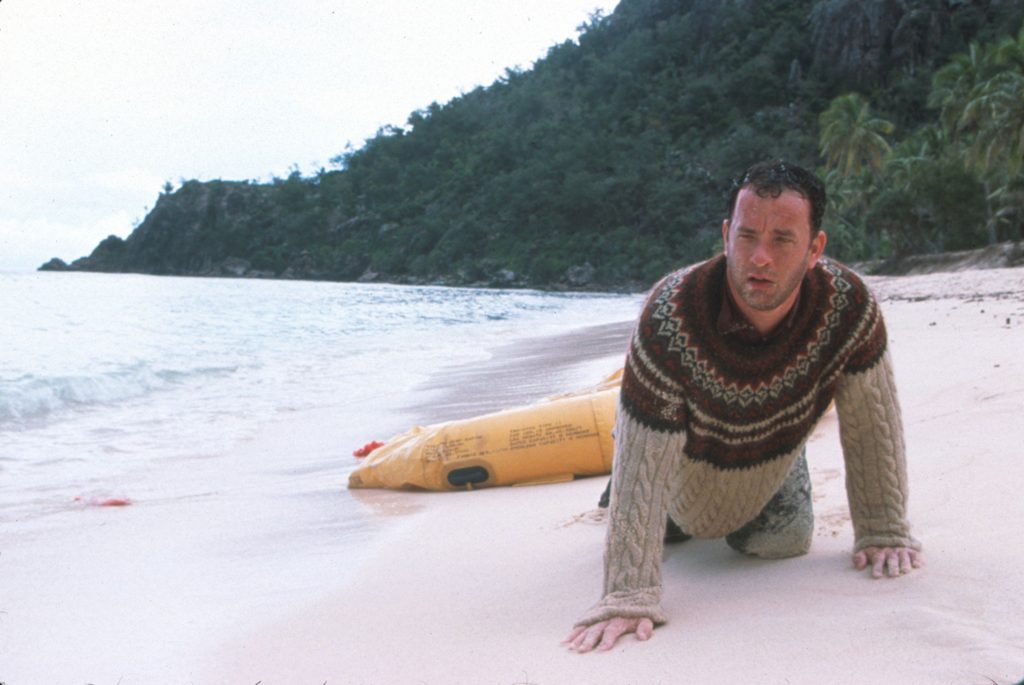Cast Away (2000)

While finding many scenes of Cast Away to be fascinating, I must say that as a whole I was less than impressed with the end result. Tom Hanks gives an incredibly self-sacrificing performance, and is by far the best thing going for this otherwise mundane story of a big-shot FedEx exec whose plane crash lands in the ocean, and he ends up stranded on a deserted island. After determining there is no way off the island, he makes a way of life for himself, always hoping someone will eventually come rescue him.
There are some lessons to be learned from the themes of Cast Away, but the only real one Zemeckis is striving for is of Time. Great emphasis is placed on matters of time: FedEx wants everything to be delivered on time, Hanks places a timer in a package to determine how long it took to be delivered, he is given a timepiece by his girlfriend, he measures the time on the wall of the island cave, etc. The only thing it doesn’t show is Tom Hanks taking the time to appreciate the things that matter most, and of course, he soon realizes this when it’s all taken away. It’s an important theme, but also one which is delivered in too ostentatious a fashion, so much so that freeze frames and pointing arrows anytime an “important theme” prop occurred would not have made it any more obvious. There are other themes, wings of hope, crossroads, and many other clichés employed throughout, but these were also just as obvious.
While thematically I felt Cast Away to be uninteresting, I still feel compelled to recommend the film for Tom Hanks’ incredible performance. One great performance does not always a good film make, but when the performance is 80% of the film, it’s vital, and this is yet another Oscar-worthy role in an already impressive career full of them. The acting is all the more impressive when you consider he must make his every thought and action obvious to us without dialogue. There is a bit of a cheat when Hanks uses a volleyball (a present from one of the FedEx packages which wash up on the island with him) as a surrogate friend in order to say the things which can’t be readily seen with just body language alone, but this at least is handled with emotional flair.
There are long stretches of time when not a lot is going on, showing us how Hanks opens a coconut, starts a fire, and other things which most filmmakers would have skipped over thinking they are too boring to showcase, yet somehow they rank among the most memorable scenes of the film. However, they are also the longest scenes of the movie. When you realize the film spends more time in coconut opening than in Hanks relationship with Helen Hunt, you see how Cast Away needed a bit more shoring up in the thematic department if Zemeckis wanted to really drive his points home, especially when you consider those scenes have little to do with what the film is really supposed to be about.
Cast Away is still a very interesting film, and will most likely keep most viewers’ attentions riveted right up to the very end, mostly because we are always anticipating something happening to make an important point. Whether or not it makes this important point by the end of the film is arguable, but from my point of view I felt something was definitely missing and, sad to say it, I believe this thing is “The Point of it All”.
As a tale of survival, it’s an interesting and well-conceived parable, but in all other departments the plotting and writing are rather anemic. The irony of the experience is that the less Hanks says, the more the film seems to have something to say.
Qwipster’s rating: B+
MPAA Rated: PG-13 for adult themes and some language
Running Time: 143 min.
Cast: Tom Hanks, a volleyball, Helen Hunt
Director: Robert Zemeckis
Screenplay: William Broyles Jr.
